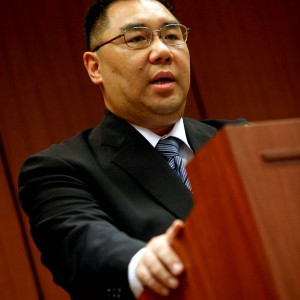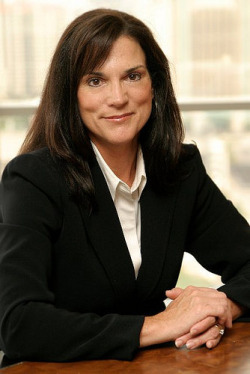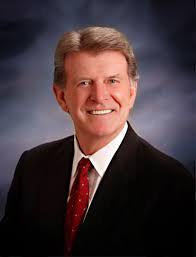Two Hong Kong-based stock analysts recently met with the Macanese Gaming Inspection & Coordination Bureau. Much to their surprise, when they asked “what
 positive policy measures can be enacted to help stop the trend of negative gaming revenue growth,” they were led to believe “the current negative run-rate of gaming revenues is so far not a major concern.” This comes on the heels of Chief Executive Fernando Chui‘s prediction of a 31% decline in gambling revenues. Chui also vowed to “adjust the pace” of casino growth in Macao, “without changing the momentum.” (Two goals that sound, at first blush, irreconcilable.) He promised tighter regulation and more attention paid to problem gambling. Job losses, Chui warned, might be a side effect of his new policies.
positive policy measures can be enacted to help stop the trend of negative gaming revenue growth,” they were led to believe “the current negative run-rate of gaming revenues is so far not a major concern.” This comes on the heels of Chief Executive Fernando Chui‘s prediction of a 31% decline in gambling revenues. Chui also vowed to “adjust the pace” of casino growth in Macao, “without changing the momentum.” (Two goals that sound, at first blush, irreconcilable.) He promised tighter regulation and more attention paid to problem gambling. Job losses, Chui warned, might be a side effect of his new policies.
Then there’s the dreaded smoking ban. Since smokelessness and a Macao casino seem like a contradiction in terms, operators have a right to be concerned. Still, the visiting Hong Kong analysts felt Chui was “too bearish” about the casinos and, even were he right, they’d still post an operating profit: “Hence, despite Macau’s reliance on the gaming industry for tax receipts, we have not yet reached a crisis point where policy negotiations need to be held between the mainland and Macau governments to stop the bleeding from negative gaming growth,” they concluded.
Chui’s priorities, aside from a citywide minimum wage, include expansion of public housing and improved vehicular access to Macao itself. With those issues on his plate, one can see why the welfare of casino operators is not his primary concern. Besides, under a government mandate to diversify his economy, Chui can take heart in figures that show Chinese tourists visiting more, if gambling less. Whether Macao’s government can live with 30% less casino tax revenue remains to be seen.
* Las Vegas Sands finds itself facing a divided Republican caucus in Florida. It’s lobbying for megaresorts in Miami and Fort Lauderdale, but passage of a 316-page, gaming-expansion bill looks more dubious than ever. There are outright opponents, like state Senate President Andy Gardiner (R), and compromise brokers like Florida Chamber of Commerce President Mark Wilson, who advocates staying the course with the Sunshine State’s seven Seminole Tribe casinos: “Now is exactly not the time to throw all that out and go the way of Nevada, go the way of Atlantic City.”
House Regulatory Affairs Chairman Jose Felix Diaz (R) dissed colleague Dana  Young‘s ambitious proposal at the very outset of hearings, saying, “Welcome to the most anticipated non-event of the year.” Young herself expressed doubt as to whether the bill would make it out of committee. State Sen. Rob Bradley (R) kept his poker face, saying, “The House has taken a very comprehensive approach. We understand that that’s the position of House leadership. If they are able to pass that bill in some form out of the House, then we will workshop it and take a very serious look at it. Meanwhile, we’re pursuing negotiations with the [Seminole] tribe.”
Young‘s ambitious proposal at the very outset of hearings, saying, “Welcome to the most anticipated non-event of the year.” Young herself expressed doubt as to whether the bill would make it out of committee. State Sen. Rob Bradley (R) kept his poker face, saying, “The House has taken a very comprehensive approach. We understand that that’s the position of House leadership. If they are able to pass that bill in some form out of the House, then we will workshop it and take a very serious look at it. Meanwhile, we’re pursuing negotiations with the [Seminole] tribe.”
Another senator likened Young’s mid-session initiative to tossing a side of beef into a shark tank. Gardiner restricted himself to Zen-like utterances. No Casinos boss John Sowinski offered nonsequiturs like, “Turning Florida into a casino destination makes about as much sense as a bank getting into the sub-prime mortgage business.”
Complications with the Seminoles have run into complications based on legislators’ doubts that, despite a complicated, sliding-scale formula intended to benefit the state, Tallahassee may never see more than 15% of Seminole revenues. A compromise that’s being mooted is splitting the baby by letting parimutuels get blackjack, extending Seminole offerings to craps and roulette, and tinkering with the revenue-sharing math. The $822 million question is, with a health care-funding crisis looming, can the state afford not to make a deal with the Seminoles?
* Not even Gov. C.L. “Butch” Otter‘s veto pen can save “instant racing” in Idaho, where  both houses of the Lege have voted, with veto-proof majorities, to outlaw the machines. Legislative reactions range from chagrin from solons who think they were sold a bill of goods when instant racing was adopted to predictions that this will be the death of Idaho’s eight horseracing tracks.
both houses of the Lege have voted, with veto-proof majorities, to outlaw the machines. Legislative reactions range from chagrin from solons who think they were sold a bill of goods when instant racing was adopted to predictions that this will be the death of Idaho’s eight horseracing tracks.
Again, the GOP found itself divided. “It’s blowing everything out of the water. They’ve invested millions. People’s jobs are on the line. So I don’t think this is a viable option, ” said racing proponent state Rep. Christy Perry. But state Rep. Luke Malek spoke for the majority when he said, “We thought we were supporting a game of skill. It turns out, that isn’t what we got.” Unless the tracks can pull off a lobbying miracle, Idaho will revert to a state where parimutuel wagering, a lottery and tribal casinos are the only permissible forms of gambling.

